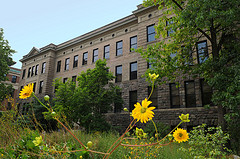PSYCHOLOGY
Ways in which psychology can help eliminate the use of fertilizers on the U-M campus include public, binding commitments that increase lasting action (Katzev, 1986). For example, we could create a U-M pledge that would have sustainable lawn practices listed and would be signed by our Ground Services. We can also work to plant more native species that do not require as many resources. Posting signs around campus informing the students, faculty, and public about how the sustainable the grounds are could lead to more pressure on the University to change its practices. The problem we are seeing is that people care about nature, but they are e ruining it through using fertilizers. Thus, we need informative sustainable landscapes (Clayton et al., 2005).
WHAT IS PSYCHOLOGY?
psychology is a social science about the study of the mind and body
WHY IS IT USEFUL?
focused on improving human functioning and well-being
(Smith, 2012)
psychology is a social science about the study of the mind and body
WHY IS IT USEFUL?
focused on improving human functioning and well-being
(Smith, 2012)
References:
Clayton, Susan and Amara Brook. "Can Psychology Help Save the World? A Model for Conservation Psychology."
Analyses of Social Issues and Public Policy. 2005. Vol 5., No.1. pp.87-102.
Katzev, Richard. "The impact of commitment in promoting consumer energy conservation." Consumer Behavior and
Energy Policy. 1986. NY: Praeger. pp. 280-294.
Smith, Laura. "Psychology and Environment." Environment 211. Lecture. University of Michigan. 2012.
Clayton, Susan and Amara Brook. "Can Psychology Help Save the World? A Model for Conservation Psychology."
Analyses of Social Issues and Public Policy. 2005. Vol 5., No.1. pp.87-102.
Katzev, Richard. "The impact of commitment in promoting consumer energy conservation." Consumer Behavior and
Energy Policy. 1986. NY: Praeger. pp. 280-294.
Smith, Laura. "Psychology and Environment." Environment 211. Lecture. University of Michigan. 2012.

LAWNCARE LEADER
The Dana Building at the University of Michigan features native plants in its surrounding landscape.
The Dana Building at the University of Michigan features native plants in its surrounding landscape.
GREEN GROUNDS
Fertilizer Usage and its Alternatives at the University of Michigan

GREEN GROUNDS
http://farm8.staticflickr.com/7167/6505369825_b268d3104a_m.jpg